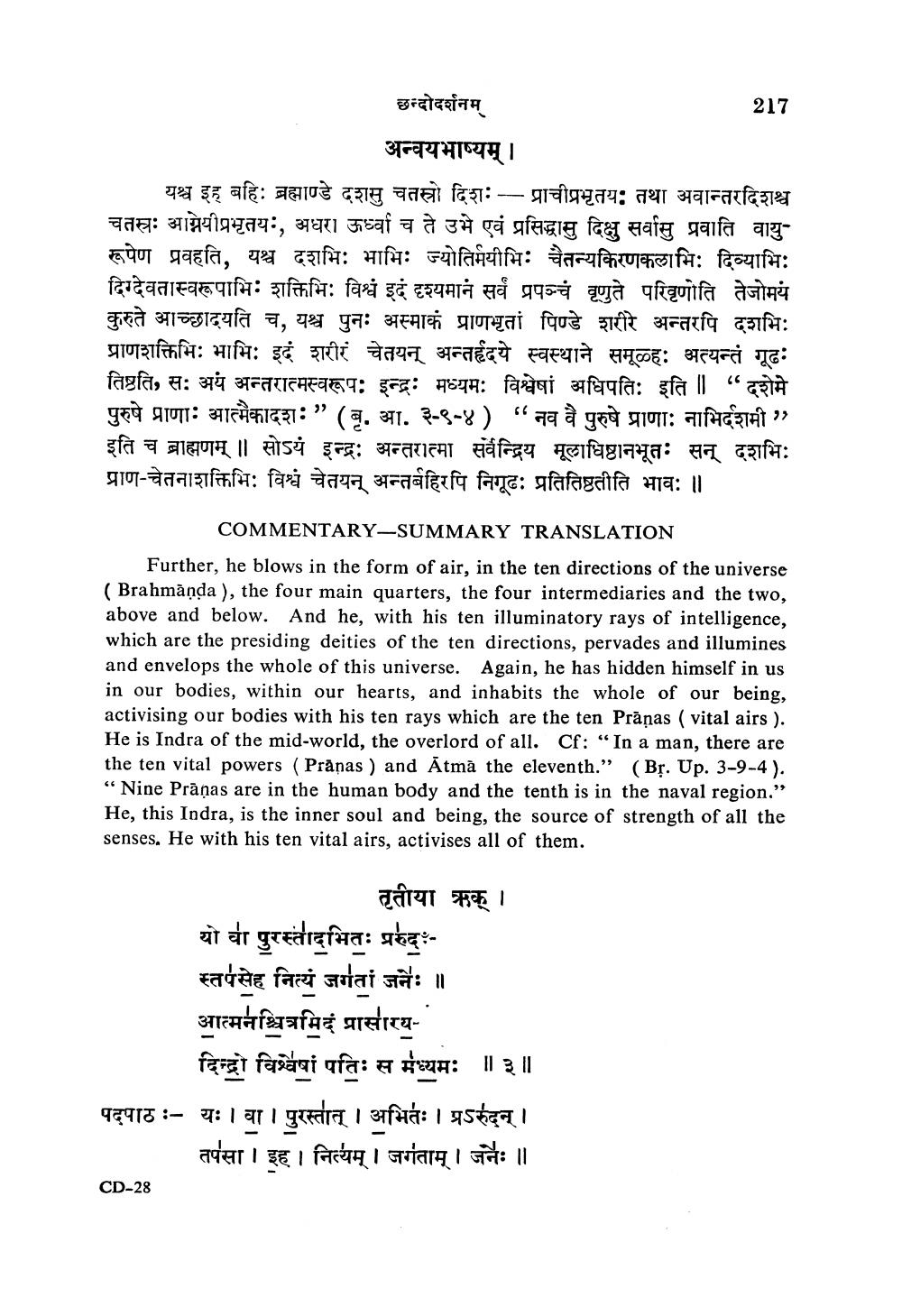________________
छन्दोदर्शनम
217
अन्वयभाष्यम् । यश्च इह बहिः ब्रह्माण्डे दशसु चतस्रो दिशः- प्राचीप्रभृतयः तथा अवान्तरदिशश्च चतस्रः आग्नेयीप्रभृतयः, अधरा ऊर्ध्वा च ते उभे एवं प्रसिद्धासु दिक्षु सर्वासु प्रवाति वायुरूपेण प्रवहति, यश्च दशभिः भाभिः ज्योतिर्मयीभिः चैतन्यकिरणकलाभि: दिव्याभिः दिग्देवतास्वरूपाभिः शक्तिभिः विश्वं इदं दृश्यमानं सर्वं प्रपञ्चं वृणुते परिवृणोति तेजोमय कुरुते आच्छादयति च, यश्च पुनः अस्माकं प्राणभृतां पिण्डे शरीरे अन्तरपि दशभिः प्राणशक्तिभिः भाभिः इदं शरीरं चेतयन् अन्तर्हृदये स्वस्थाने समूळ्हः अत्यन्तं गूढः तिष्ठति, सः अयं अन्तरात्मस्वरूपः इन्द्रः मध्यमः विश्वेषां अधिपतिः इति || "दशेमे पुरुषे प्राणाः आत्मैकादशः" (बृ. आ. ३-९-४) " नव वै पुरुषे प्राणा: नाभिर्दशमी" इति च ब्राह्मणम् ॥ सोऽयं इन्द्रः अन्तरात्मा सर्वन्द्रिय मूलाधिष्ठानभूतः सन् दशभिः प्राण-चेतनाशक्तिभि: विश्वं चेतयन् अन्तर्बहिरपि निगूढः प्रतितिष्ठतीति भावः ॥
COMMENTARY-SUMMARY TRANSLATION
Further, he blows in the form of air, in the ten directions of the universe ( Brahmānda ), the four main quarters, the four intermediaries and the two, above and below. And he, with his ten illuminatory rays of intelligence, which are the presiding deities of the ten directions, pervades and illumines and envelops the whole of this universe. Again, he has hidden himself in us in our bodies, within our hearts, and inhabits the whole of our being, activising our bodies with his ten rays which are the ten Prānas ( vital airs ). He is Indra of the mid-world, the overlord of all. Cf: “In a man, there are the ten vital powers (Pranas) and Atmā the eleventh." (Br. Up. 3-9-4). “Nine Prāņas are in the human body and the tenth is in the naval region.” He, this Indra, is the inner soul and being, the source of strength of all the senses. He with his ten vital airs, activises all of them.
तृतीया ऋक् । यो वा पुरस्तादभितः प्ररुः स्तपसेह नित्यं जगतां जनेः ॥ आत्मनश्चित्रमिदं प्रासारय
दिन्द्रो विश्वेषां पतिः स मध्यमः ॥ ३॥ पदपाठ :- यः । वा । पुरस्तात् । अभितः । प्रऽरुदन् ।
__ तप॑सा । इह । नित्यम् । जगताम् । जनैः ॥
CD-28




